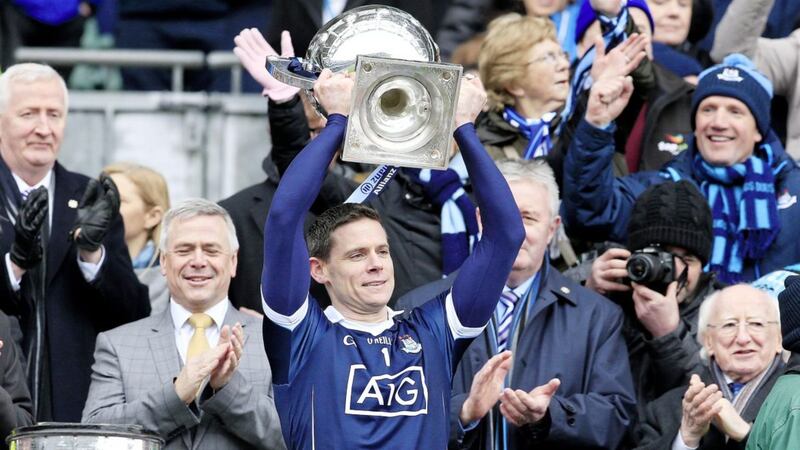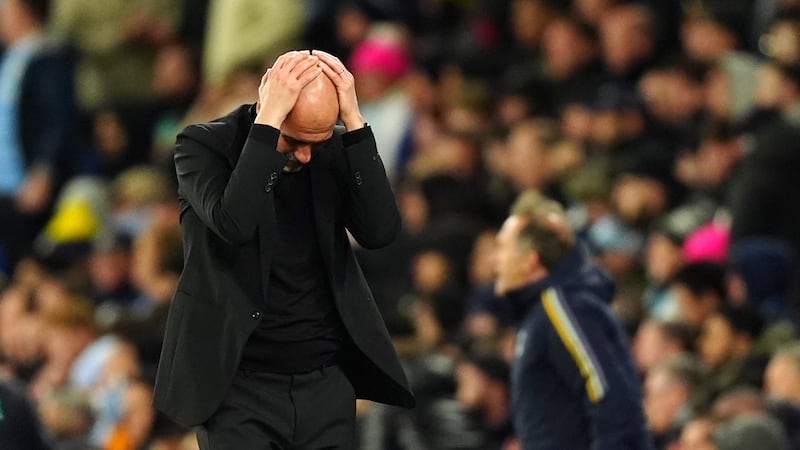T HE emotions of many GAA fans will swing like a pendulum in any given week – unintentionally perhaps. It’s doom and gloom at the minute for Tyrone fans.
Armagh supporters are expecting their team to hold onto a lead and finish a team off one of these days.
Fermanagh supporters will hope that many of them are able to stay awake for about 60 minutes.
Rory Gallagher is unlikely to care about the aesthetics, but surely there has to be a better way?
Meanwhile Cavan came very close to claiming a major scalp in their game with Kerry.
This experience (especially in Division One) will stand the Breffnimen in good stead when it comes to the Ulster Championship later in the year. Antrim lost again. Down won. Two points collected.
Move on. I didn’t expect Monaghan to be beaten in Roscommon.
I think this was a case of all the short-term energy built up in the pre-season being directed toward the Dublin game and the result.
Unfortunately, it is human nature to take the foot off the gas after such a result.
I would suspect, from the players’ perspective, the result against Roscommon can be traced back to training during the week when perhaps it was a bit ‘flat’.
It happens. A result like this does a team no harm in the long-run and checks expectations, sharpening the mind and the body.
In the same way that a win doesn’t make all aspects of the game satisfactory, neither does a loss make a performance overly negative. The key to success, in my experience, centres around one thing: Performance consistency.
What sets Dublin apart from the best of rest over the last number of years, is the quality and consistency of their performances.
Fans of sport in general will understand just how difficult it is to maintain performance consistency to such a high level.
Tyrone, Kerry and Mayo suffer from periods of inconsistency when results are not ground out, when heavy defeats are inflicted and perhaps even the team/ county is in transition through a difficult period.
Leaving last weekend’s defeat to Monaghan aside, Dublin’s ability to integrate youth and quality into a naturally ageing team has allowed the team to transition seamlessly through various All-Ireland title wins since 2011.
Their team and culture is based around hard work, humility and consistency.
Journalists tend not to enjoy Jim Gavin’s interviews nor indeed those of the players. They talk about the process, performance and consistency.
They are, in other words, boring.
Hard as it is to accept, the science behind success can be pretty straightforward. Sometimes people want to know more. Sometimes people think there is a magic formula to winning.
We are living in an age when information and data is valued like gold dust.
However, sometimes it is the most obvious aspects of sport which makes winning and sporting success prevalent. It isn’t a new science.
A book I recently came across, Bounce by Matthew Syed, a fivetime world table tennis champion, sought to reveal the hidden clues to success. It can and is used by many leading professionals in the world of sport and leadership.
Becoming a top player in any sport, especially Gaelic football, does not come down to inherited talent.
If it did, talent would only be a natural element, say less than five per cent.
The ‘talented myth’ is something we would come across regularly in the GAA. How many times have we lost those ‘naturally gifted/ talented’ stars because of outside elements we – or perhaps they – are unable to control? The key to success and winning comes down to hard work.
Endless hours practising. Anthony Tohill (inset) was an iconic footballer, who helped Derry win an All-Ireland and dominated the midfield sector for a decade or more against many of the great teams at the time.
As a big man who hit Derry’s frees also, when you consider the work-rate required in that area, did it come natural to him to retain enough energy in reserve to hit the frees from the ground also?
His pursuit of greatness narrowed down to endless hours lifting weights in the gym (you have to remember that the gym wasn’t considered a key part of training at the time) and kicking frees from the ground, well away from collective training of the panel.
The same dedication to practising and preparing might be said of Peter Canavan, Ross Carr or Oisin McConville.
How many times do we pass Gaelic football pitches nowadays and see someone out kicking frees from the ground or practising by themselves? How many dedicated players in our own clubs do that extra hour required alone?
To achieve excellence, one has to step outside their comfort zone.
Endless amount of books are dedicated to the same theme and the same answer, believe it or not, pertaining to attaining consistent excellence reveals itself. You need to consistently step outside the comfort zone. It is a fact that there were so many players who came through my own club and indeed my own county with more talent than me.
The differential in any success, individual or collective, is the ability to work harder than your opponent, to be able to consistently step out of that comfort zone and go to dark places physically and mentally within a performance (including training) to win.
Even in defeat, while the result may not have be considered desirable, individually you can take comfort in a personal performance.
What you have in Dublin is a strong culture and commitment to that thing called hard work. You have a panel of players willing to go out of their comfort zone.
While for many it may be too simplistic to state the obvious, the fact is that Dublin are champions because they are consistently the hardest working side in the country.
In a poor culture (like that witnessed throughout the late 90s and the noughties),
Dublin won Leinster titles but nothing more.
I can’t help but feel that any new rule changes introduced in the past had some origin in trying to negate Dublin’s dominance.
Who mastered the kick-out? Cluxton.
Who has mastered the counter-attack? Dublin.
Rules or no rules, the Dubs still find a way to win. No amount of rule changes will affect Dublin’s medium-term results.
As long as their culture remains the same, all other teams lacking their level of consistency will be unable to wrest their stranglehold on GAA competitions. To beat the Dubs you have to out-work the Dubs.
Monaghan managed it on a rare day.
But they lacked this consistency in Roscommon.
That’s where the Dubs are different. They are the performance bar.
It’s not a science as to how they got here. It is simply through sheer bloody hard work.







